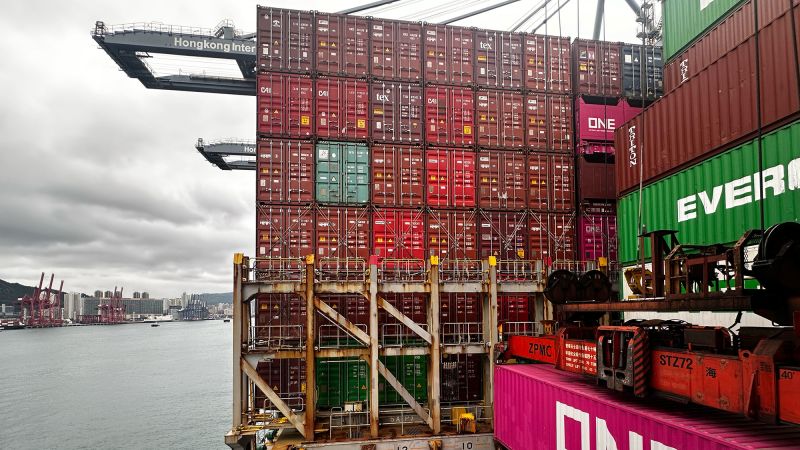The Impact Of The US-China Trade War On Global Shipping

Welcome to your ultimate source for breaking news, trending updates, and in-depth stories from around the world. Whether it's politics, technology, entertainment, sports, or lifestyle, we bring you real-time updates that keep you informed and ahead of the curve.
Our team works tirelessly to ensure you never miss a moment. From the latest developments in global events to the most talked-about topics on social media, our news platform is designed to deliver accurate and timely information, all in one place.
Stay in the know and join thousands of readers who trust us for reliable, up-to-date content. Explore our expertly curated articles and dive deeper into the stories that matter to you. Visit Best Website now and be part of the conversation. Don't miss out on the headlines that shape our world!
Table of Contents
The US-China Trade War: Uncharted Waters for Global Shipping
The US-China trade war, a tumultuous period marked by escalating tariffs and trade restrictions, left an indelible mark on the global economy. Beyond the immediate impact on manufacturing and consumer prices, the conflict significantly disrupted global shipping, creating ripple effects that are still felt today. This article delves into the profound impact of this trade war on the maritime industry, exploring the challenges faced and the lasting consequences for global supply chains.
The Initial Shockwaves:
The imposition of tariffs in 2018 triggered an immediate surge in shipping activity as businesses rushed to import goods before tariffs took effect. This led to port congestion, increased freight rates, and a strain on shipping capacity. The uncertainty surrounding future trade policies added to the volatility, making it difficult for shipping companies to plan their routes and capacity allocation. This period saw significant increases in ocean freight rates, particularly on key trade lanes between Asia and North America.
Shifting Trade Dynamics:
The trade war forced companies to re-evaluate their supply chains. Many businesses diversified their sourcing, moving production away from China to countries like Vietnam, India, and Mexico. This led to a shift in shipping patterns, with increased demand on routes connecting these alternative manufacturing hubs to major consumer markets. This supply chain diversification, while intended to mitigate risks, created new logistical complexities and added to overall shipping costs.
The Impact on Shipping Companies:
The fluctuating demand and uncertainty created by the trade war put immense pressure on shipping companies. Some carriers experienced significant financial strain, while others adapted by adjusting their fleet deployment and service offerings. The need for greater flexibility and agility in responding to shifting market conditions became paramount. This period highlighted the importance of supply chain resilience and the need for effective risk management strategies within the shipping industry.
Long-term Consequences:
The US-China trade war's impact on global shipping extends beyond the immediate period of tariff escalation. The heightened awareness of supply chain vulnerabilities led to a push for greater diversification and resilience. Businesses are increasingly investing in technologies like blockchain and AI to improve transparency and efficiency in their supply chains. The experience also underscored the importance of robust risk management strategies to mitigate future disruptions.
Looking Ahead:
While the intensity of the US-China trade war has subsided, its legacy continues to shape the global shipping landscape. The increased focus on supply chain resilience, the adoption of new technologies, and the ongoing shift in global trade patterns are all long-term consequences. Navigating this evolving environment requires shipping companies to remain adaptable and innovative, leveraging data-driven insights to optimize operations and manage risks effectively. The future of global shipping will likely be defined by its ability to adapt to geopolitical uncertainty and embrace technological advancements.
Keywords: US-China Trade War, Global Shipping, Ocean Freight Rates, Supply Chain, Port Congestion, Supply Chain Diversification, Supply Chain Resilience, Blockchain, AI, Maritime Industry, International Trade.
Call to Action (subtle): Stay informed about the latest developments in global trade and shipping by following reputable industry news sources. Understanding these trends is crucial for businesses involved in international commerce.

Thank you for visiting our website, your trusted source for the latest updates and in-depth coverage on The Impact Of The US-China Trade War On Global Shipping. We're committed to keeping you informed with timely and accurate information to meet your curiosity and needs.
If you have any questions, suggestions, or feedback, we'd love to hear from you. Your insights are valuable to us and help us improve to serve you better. Feel free to reach out through our contact page.
Don't forget to bookmark our website and check back regularly for the latest headlines and trending topics. See you next time, and thank you for being part of our growing community!
Featured Posts
-
 From Atlanta Demons To Nl East Contenders The Mets Rise
Jun 18, 2025
From Atlanta Demons To Nl East Contenders The Mets Rise
Jun 18, 2025 -
 Wnba Tuesday Night 5 Smart Bets And Player Props June 17 2025
Jun 18, 2025
Wnba Tuesday Night 5 Smart Bets And Player Props June 17 2025
Jun 18, 2025 -
 Severe Weather Alert Storms And Heavy Rain Hitting North Georgia
Jun 18, 2025
Severe Weather Alert Storms And Heavy Rain Hitting North Georgia
Jun 18, 2025 -
 Analysis Chinas Expanding Aircraft Carrier Fleet And Its Pacific Strategy
Jun 18, 2025
Analysis Chinas Expanding Aircraft Carrier Fleet And Its Pacific Strategy
Jun 18, 2025 -
 Mouth Tape For Sleep Fact Vs Fiction A Critical Review
Jun 18, 2025
Mouth Tape For Sleep Fact Vs Fiction A Critical Review
Jun 18, 2025
Latest Posts
-
 Democratic Cities Face Increased Ice Deportations Under Trumps Directive
Jun 18, 2025
Democratic Cities Face Increased Ice Deportations Under Trumps Directive
Jun 18, 2025 -
 Mets Vs Braves 5 Things To Watch For This Weekend Series
Jun 18, 2025
Mets Vs Braves 5 Things To Watch For This Weekend Series
Jun 18, 2025 -
 Wnba Tuesday Night 5 Smart Bets And Player Props June 17 2025
Jun 18, 2025
Wnba Tuesday Night 5 Smart Bets And Player Props June 17 2025
Jun 18, 2025 -
 Costume Design A Crucial Element In This Directors Cinematic Universe
Jun 18, 2025
Costume Design A Crucial Element In This Directors Cinematic Universe
Jun 18, 2025 -
 Analysis Of Ice Data The Number Of Immigrants With Serious Criminal Convictions In Custody Is Low
Jun 18, 2025
Analysis Of Ice Data The Number Of Immigrants With Serious Criminal Convictions In Custody Is Low
Jun 18, 2025
